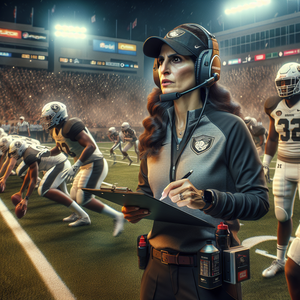Behind the Numbers: What Jim Harbaugh's Salary Says About College Football Economics

The financial ecosystem of college football is vast and multifaceted. It comprises various revenue streams, including ticket sales, merchandise, donations, and, most notably, lucrative television contracts. The College Football Playoff (CFP) and conference network deals have significantly transformed the financial landscape, resulting in unprecedented revenue for top-tier programs. The CFP, for instance, generated over $500 million in revenue in its inaugural year, showcasing the immense financial potential of college football. Harbaugh’s salary is emblematic of this trend, reflecting a broader shift where schools are compelled to offer competitive salaries to attract and retain top coaching talent. As college football generates more revenue, it is not surprising to see salaries for head coaches at elite programs rival those of professional coaches in the NFL. This trend signifies a new era in college athletics, where financial investment in coaching staff is viewed as essential to achieving success both on and off the field.
Television Deals and Their Impact
Television deals play a pivotal role in shaping the salaries of college coaches. The Big Ten Conference, for example, recently signed a media rights deal worth over $7 billion, significantly augmenting revenue for its member schools. Such financial resources empower athletic departments to allocate more funds toward coaching salaries, thereby increasing the competition for top-tier talent. Harbaugh's position at Michigan, a flagship program in the Big Ten, positions him to benefit directly from these financial gains. The increased visibility and financial backing allow Michigan to compete not only on the field but also in the recruiting wars, as prospective players are often drawn to programs that can invest in quality coaching staff and state-of-the-art facilities. Harbaugh’s high salary, therefore, can be seen as a strategic investment by Michigan to uphold its competitive edge in a rapidly evolving landscape.
Financial Pressures on Athletic Programs
While the influx of revenue from television deals and other sources has enabled programs to invest heavily in coaching salaries, it has also introduced financial pressures. Athletic departments must balance their budgets meticulously, as the costs associated with high salaries can strain resources, particularly in the event of underperformance. Programs that fail to deliver results may find themselves under scrutiny from stakeholders, leading to a cycle where financial investment is directly tied to on-field success. In Harbaugh’s case, his salary imposes significant expectations for success. Each season, the Michigan Wolverines are expected to contend for conference titles and playoff berths, which places immense pressure on Harbaugh and his coaching staff. The expectation to justify such an exorbitant salary can influence coaching decisions, recruitment strategies, and even player morale, as the stakes continue to rise.
Implications for Future Coaching Contracts
The economic model established by Harbaugh’s contract has profound implications for future coaching contracts throughout college football. As programs continue to generate revenue through television deals and increased fan engagement, the expectation for competitive salaries will likely escalate. This trend creates a bidding war for elite coaching talent, making it imperative for schools to navigate their budgets effectively. Moreover, the correlation between coaching salaries and success may prompt a reevaluation of how programs assess their coaching staff. If higher salaries do not necessarily equate to better performance, schools may need to consider alternative metrics for evaluating coaching effectiveness. This could lead to a more nuanced approach to contract negotiations and performance evaluations in the future, with an emphasis on sustainable success rather than immediate results.
Jim Harbaugh's salary is more than just a number; it is a reflection of the complex economics of college football. As revenue generation continues to evolve with television deals and other financial opportunities, the expectations placed on coaches will intensify. Harbaugh's case illustrates the delicate balance between financial investment and performance, shedding light on the broader implications for college athletics. The landscape of college football is ever-changing, and it remains to be seen how future coaching contracts will adapt to the realities of this dynamic and lucrative industry. Understanding the economic forces at play not only enriches our perspective on individual coaching salaries but also provides insight into the future trajectory of college football as a whole.
Athletic Director
Core Responsibilities
Oversee the strategic and financial planning of the athletic department, ensuring alignment with the university's goals.
Manage budgets, including coaching salaries and operational costs, while maximizing revenue generation through sponsorships and ticket sales.
Cultivate relationships with key stakeholders, including the university administration, alumni, and community to enhance support for the athletic program.
Required Skills
Strong financial acumen and experience in budget management.
Excellent communication and leadership skills to navigate complex organizational dynamics.
Familiarity with NCAA regulations and compliance issues.
Common Employers
Major universities and colleges, particularly those with prominent athletic programs.
Sports Marketing Manager
Core Responsibilities
Develop and implement marketing campaigns to promote athletic events and enhance brand visibility for the athletic department.
Analyze market trends and fan engagement data to tailor promotional strategies that drive ticket sales and merchandise revenue.
Collaborate with media partners to maximize exposure through television and digital platforms.
Required Skills
Proficiency in digital marketing tools and analytics software.
Strong creative and strategic thinking abilities to design compelling marketing initiatives.
Experience in relationship management with sponsors and media outlets.
Common Employers
Athletic departments, sports agencies, and marketing firms specializing in sports promotion.
Sports Financial Analyst
Core Responsibilities
Conduct financial analyses to assess the economic impact of coaching contracts, recruitment expenses, and operational budgets.
Prepare reports and presentations for stakeholders to inform decision-making regarding financial investments in athletic programs.
Monitor revenue streams, including ticket sales and sponsorship deals, to optimize financial performance.
Required Skills
Strong analytical skills with proficiency in financial modeling and data analysis tools.
Ability to communicate complex financial concepts to non-financial stakeholders.
Experience in sports finance or a related field, preferably within a collegiate or professional sports environment.
Common Employers
Athletic departments, sports consulting firms, and financial institutions with a focus on sports finance.
Compliance Officer in Athletics
Core Responsibilities
Ensure adherence to NCAA regulations and institutional policies regarding recruiting, scholarships, and financial aid.
Conduct regular audits and assessments of athletic programs to identify compliance risks and implement corrective actions.
Serve as a resource for coaches and staff on compliance-related issues, fostering a culture of integrity within the athletic department.
Required Skills
In-depth knowledge of NCAA rules and regulations.
Strong attention to detail and organizational skills for managing compliance processes.
Excellent interpersonal skills to effectively communicate with diverse stakeholders, including coaches and student-athletes.
Common Employers
Colleges and universities, particularly those with extensive athletic programs.
Head Coach (Football)
Core Responsibilities
Develop and implement training programs and game strategies to maximize team performance on the field.
Recruit and evaluate talent, building a competitive roster that meets the program's goals and standards.
Collaborate with athletic administration to manage budgets and fundraising efforts for the football program.
Required Skills
Proven coaching experience at a collegiate or professional level, with a deep understanding of the game.
Strong leadership and motivational skills to inspire and develop players and coaching staff.
Effective communication skills to engage with media, alumni, and prospective recruits.
Common Employers
NCAA Division I and II football programs, particularly those with significant financial resources for athletics.


